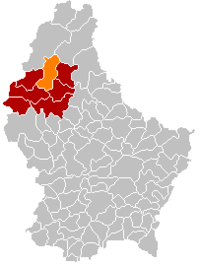Wiltz
|
Wiltz Wolz |
||
|---|---|---|
| Commune | ||

Town hall
|
||
|
||
 Map of Luxembourg with Wiltz highlighted in orange, and the canton in dark red |
||
| Coordinates: 49°58′00″N 5°56′00″E / 49.9667°N 5.9333°ECoordinates: 49°58′00″N 5°56′00″E / 49.9667°N 5.9333°E | ||
| Country |
|
|
| Canton | Wiltz | |
| Government | ||
| • Mayor | Fränk Arndt | |
| Area | ||
| • Total | 39.25 km2 (15.15 sq mi) | |
| Area rank | 13th of 105 | |
| Highest elevation | 518 m (1,699 ft) | |
| • Rank | 14th of 105 | |
| Lowest elevation | 285 m (935 ft) | |
| • Rank | 90th of 105 | |
| Population (2014) | ||
| • Total | 6,243 | |
| • Rank | 21st of 105 | |
| • Density | 160/km2 (410/sq mi) | |
| • Density rank | 46th of 105 | |
| Time zone | CET (UTC+1) | |
| • Summer (DST) | CEST (UTC+2) | |
| LAU 2 | LU00005009 | |
| Website | wiltz.lu | |
Wiltz (Luxembourgish: Wolz pronounced [ˈvolt͡s]) is a commune with town status in north-western Luxembourg, capital of the canton Wiltz. Wiltz is situated on the banks of the river Wiltz. It was also a battleground in the Battle of the Bulge, near the end of World War II. A local airfield (near the village of Noertrange) was used by both sides of the conflict, depending on the location of the Front.
As of 2014[update], the town of Wiltz, which lies in the south of the commune, has a population of 5,469. Other towns within the commune include Weidingen.
One of the main features of the town is Wiltz Castle which belonged to the former Counts of Wiltz. This castle, which is situated on 600 acres (2.4 km2) of lawns and gardens, contains hundreds of rooms. It was completed in 1727, and the final Count died in 1793. It served as a private girls school from 1851 until 1950, and became a retirement home after that. The industrialisation of Wiltz was advanced in the late 19th and early 20th century by the leather industry, namely by IDÉAL Tannerie de Wiltz S.A. belonging to the Adler & Oppenheimer trust.
During World War II, Luxembourg was occupied 10 May 1940 (the first day of the Battle of France). On 31 August 1942, a general strike was initiated in Wiltz, that spread throughout the country. On 16 December 1944, the Wehrmacht surprisingly began the Ardennes Offensive. Norman Cota and his General Staff left Wiltz when the Germans came nearer. In the evening of 19 December, after some combat, the last Americans left Wiltz. On January 1945, Wiltz was liberated by American troops after intensive combats during the days before.
...
Wikipedia

